
Photo courtesy of Tigercat
New Smyrna Beach, Florida-based companies owned by brothers Keith and Glen Jung known as 4 Jays Recycling C&D Landfill and 4 Jays Land Services have deployed two grinders made by Tigercat to help them process and recycle wood for their regional market.
According to Canada-based Tigercat, the brothers’ parents, Ed and Marion, started the land-clearing business in 1983 and the two brothers purchased the company in 2004, having worked alongside their father since they were teenagers.
After Glen and Keith bought the company, they identified recycling as a growth opportunity.
“We were already well experienced at land clearing, maximizing the loads and taking them to our landfill,” Glen says. “Adding the grinding just fell into place.”
Tasks including storm cleanup fed their first grinder steadily with material.
“When we bought the first one, we didn’t even know what we would do with the material,” Keith says, adding that they soon found an outlet by distributing the mulched material around municipal parks in Deltona, Florida.
As the brothers started to gain an understanding of the mulch market, they used space at the landfill facility to expand into colored mulch production, investing in screening and coloring machinery.
Today, material brought to 4 Jays' recycling facility by outside customers goes through a secondary grind process, then is screened, colored and marketed in bulk. Material generated by 4 Jays at land-clearing worksites feeds the company’s large-scale mulch production plants and bagging facilities, ultimately supplying the retail market.
The companies have identified diverting all recyclables as a core strategy.
“Our goal is to extend the life of the recycling landfill as long as possible,” Keith says. “We are trying to process everything and now we are looking forward to composting and processing other sustainable materials.”
Earlier this year, 4 Jays decided to purchase the two Tigercat 6900 grinders and say things they have learned after 20 years of wood processing helped Tigercat earn the business.
Keith says Jake Desrosiers, industrial sales representative at Tigercat dealer Tidewater Equipment in Tampa, Florida, was a great resource who is familiar with grinders after having worked with the machines for many years in a family business prior to joining the Tidewater team.
“Jake described the machine and answered the questions right,” Keith says. “He didn’t seem like a salesman but more of a resource. He gave me existing customer names for references and talked a lot about support and parts supply from Tidewater, which is critical for us. When I asked to see a machine, he took us to see the grinder with the most hours. The machine was holding up really well. It looked like it had 1,300 hours, not 3,500 hours.
“The thickness in the steel plate in the infeed floor and the side walls of the infeed and all the areas where the actual work is done is really important. We liked the structure of the mill, the top feed roller, the yoke construction and the aggressiveness of the teeth on the top roller. The size of the mill shaft and bearings, and the support of the mill bearings are impressive. In our experience, mill bearings have been the biggest cause of downtime.”
Keith also points to an operator-friendly layout with accessibility to facilitate efficient maintenance routines.
The brothers say good belt clearance and ground clearance are advantages in muddy conditions and uneven ground provided by the tracked Tigercats.
“The operator can traverse over uneven ground and adjust the pivot to create additional ground clearance or heights to discharge products into trucks,” according to Tigercat.
Latest from Construction & Demolition Recycling
- Bomag to showcase innovations on the National Mall
- NWRA, SWANA to partner on safety, education and advocacy
- Caterpillar announces collision warning system, other technology for medium wheel loaders
- ABC: Nonresidential construction adds jobs in April despite headwinds
- Demolition underway at former SC steel mill
- Turkey neglects US scrap in favor of Russian shipments
- Results of New Hampshire waste study reveal missed opportunities for diversion
- Alterra, Eco Materials open soil remediation facility in PA





